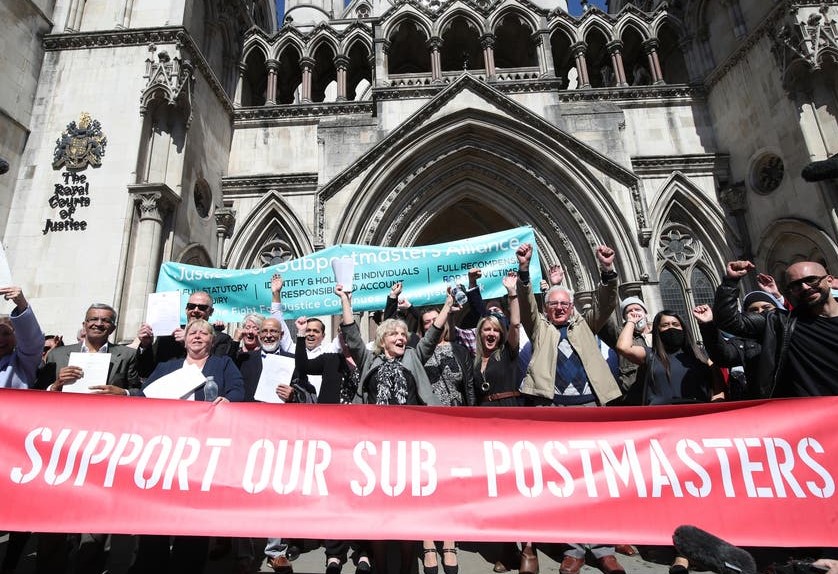By stepping back from the immediacy of the role of the Post Office in the criminalisation of hundreds of its Subpostmasters, it becomes apparent that the real problem is the ease with which the entire justice system and its institutions simply defaulted to scandalous levels of injustice, astounding levels of incompetence and widespread corruption. This unforgivable episode highlights the extent to which the justice system is entirely unfit for purpose, indicative perhaps, of the wider crisis of legitimacy within the State itself.
The overturning of 39 criminal cases by the Court of Appeal on 23 April 2021 followed the quashing of six convictions in December 2020, and marked another stage in the Post Office Horizon IT scandal. The 2021 judgements led to considerable coverage by the mainstream media, with calls for accountability for the hundreds of prosecutions that had taken place between 2000 and 2015. Criticism of Paula Vennells (CBE) Chief Executive Officer of the Post Office from 2012-19 and the institutional failings that had ruined the lives of so many innocent post office employees, was widespread.
Problems began when the Post Office installed a new IT system which had been passed on to the company when the government, who had commissioned it for the UK benefit system, realised it was not fit for purpose. The faulty system lead to a number of accountancy errors for which many hundreds of local postmasters were prosecuted. The ruthless and relentless pursuit of these employees seems all the more vindictive, in light of the many doubts and uncertainties that were features of the system and its’ operations, and that have since come to light. Rather than focusing on the IT system as the root of the accounting problems that arose across the UK, individuals were charged with criminal offences and prosecuted, unaware that hundreds of other Post Office employees were in similar situations. Problems with the system were concealed by Horizon and the Post Office, while legal representatives acting for the organisation withheld vital evidence and/or destroyed data that highlighted problems with the Horizon IT system. The prosecution and conviction of Post Office employees was rigorously pursued – even where problems had been highlighted by these employees, and in many cases, attempts had been made to recompense the Post Office for shortfalls in accounts. More recently, attempts were made to remove the judge who, having identified problems with the convictions, embarked on a programme of overturning them. It would appear that the Post Office, and those acting for it, could in light of what we now know, be seen to have been perverting the course of justice.
The decision of the Court of Appeal to overturn these convictions is undoubtedly a significant achievement for those affected and their families and friends. However, amongst the coverage, there has been very little attention directed towards the routine ways in which the criminal legal system simply went through the motions of processing and punishing these cases. Exposing a number of fundamental flaws in its operation. Indeed, these prosecutions and convictions should make us all question the principles of ‘justice’ that supposedly underpin UK criminal legal systems.

Undoubtedly, the role of the Post Office raises serious concerns and there have been muted calls for solicitors acting for the Post Office to be investigated. Acting as a private prosecutor, the organisation was in a unique position that apparently gave the Criminal Cases Review Commission (CCRC) considerable concerns when it was referred to the Court of Appeal. However, what about the more mundane operation of the system? The Post Office directed its extensive resources towards the legal prosecution of men and women in its employment. And the prosecutions were legitimated and supported by a legal system intent on obtaining criminal convictions and imposing punishment. How and why could innocent people, with legal representation, plead guilty to crimes they had not committed? Why were people, we now know to be innocent, found guilty at trial and subsequently punished? Why were many of these individuals sentenced to prison, despite having no previous convictions and previously good standing in their communities?
The true scale of this miscarriage of justice is still to come to light. According to Computer Weekly (10 May) (one of the few publications who, at the time, reported extensively on the issue) thousands more may have been affected, many postmasters, it seems, used their own funds to balance accounting errors that they were concerned about or had been told, was their personal responsibility. Those who contacted the Post Office with concerns about shortfalls were not informed that many other postmasters were experiencing similar issues. Indeed, during 2010 the Post Office was prosecuting more than one person per week, with 55 convictions secured by December of that year. According to the group (Justice for Subpostmasters Alliance (JFSA)), set up in 2009, its 555 members paid millions of pounds to cover shortfalls. In total, there were 736 ‘successful’ prosecutions based on Horizon evidence. To date those involved have been irreversibly scarred by the loss of employment and their good character. Some families had to move home, others were victims of community hostility, including violence, and for some, suicide, despair and death.
A couple of issues require further exploration when considering the wider implications of this tragedy for the wider criminal legal system. The first relates to the technical issues that were associated with the Horizon IT system. The problem with digital data is that few people understand it. This is evident in the cases where solicitors and barristers failed to question the Horizon ‘evidence’ and where sentences seemed to assume that computers were infallible, despite all claims to the contrary. When complex technical information is presented to the legal system, its authority and credibility is often taken for granted when in fact, it should be rigorously investigated. Even independent ‘experts’ work extensively on the information provided by the authorities, with limited opportunity to question or critique data that is ‘presented’ to them, often already compromised.
Secondly, and perhaps of greater concern, is the recognition these cases exemplify, that criminal justice does not consistently deliver ‘justice’. The financial might of the Post Office was directed at the prosecution of individuals for theft and false accounting, under the pretext of being in the ‘public interest’. It was legitimised by criminal legal systems across the UK that supported this process, while providing a veneer that ‘justice’ was being done. This has clearly been undermined by the fact that to date £58 million has been paid in compensation to those who it is now accepted, were victims of false prosecutions.
The failure of ‘justice’ is exemplified in the cases that were recently overturned, where in at least two, solicitors advised the accused to plead guilty in order to avoid a prison sentence. This is not by any means an unusual occurrence in the general run of business in the criminal justice system. One example (see Panorama, Scandal at the Post Office, 8 June 2020) involved Janet Skinner. She was offered a deal, via her solicitor, where a guilty plea to false accounting resulted in a charge of theft to be dropped; she entered this plea with an understanding that it would mean she was less likely to receive a custodial sentence. However, despite the guilty plea to false accounting, the mother of three was sentenced to nine months in prison. She was by no means the only one who plead guilty despite still maintaining her innocence, another was Tim Brentnall, of Pembrokeshire, similarly advised by his solicitor and barrister and given an 18 month suspended sentence with 200 hours community service for false accounting. Others were also offered this form of plea-bargaining, and even where a non-custodial punishment was imposed, the perceived guilt of the individual served to mark and stigmatise them within their community.
Seema Misra was pregnant when she was sentenced to prison in relation to missing accounts totalling £74,000. In Seema Misra’s case, evidence contained in the Post Office legal files, that showed problems with the Horizon system was never disclosed to her defence, and she was subsequently found guilty at trial. Despite her circumstances and the highly questionable purpose of custody in such cases, her experience was by no means rare. Every year, around 600 pregnant women are held in prisons in England and Wales and some 100 babies are born to women prisoners.
Following the upholding of their Appeal, family members told of the vilification they had experienced in the local community as a result of their prosecution and conviction. This too is a common experience for individuals and families who encounter the legal system. It is made all the worse by local and national newspapers, particularly but not exclusively tabloids, that present cases in a sensational and often distorted way aimed at demonising the accused and their families. Family members of those convicted described being physically attacked within the local community and having to move out of areas they had lived in for most of their lives, and previously had been respected members of. This too is a regular – but remarkably unacknowledged feature of involvement with the criminal legal system and there is very little, if any, support for the families affected.
We know that people died before their case came to court and in some cases, the deaths were by suicide. Again, not an unusual occurrence and all too often, implicated in the stress and anxiety, shame and stigma of the criminal legal process and its everyday cruelties. It was notable that many of the postmasters and postmistresses emphasised how isolated and alone they felt throughout this process, unaware of the many others in similar circumstances. The longer-term consequences of experiences of imprisonment, including separation from children, and criminal convictions on future job opportunities are immeasurable.
This issue is ongoing and there are likely to be many more cases that arise in the coming months. On 1 July, 31 new Subpostmaster appeals were in preparation, with 10 convictions certain to be quashed. In 2020, the Scottish Criminal Cases Review Commission (SCCRC) contacted those it believed may have been the victims of possible miscarriages of justice in relation to the Post Office in Scotland, while the CCRC in England is in the process of reviewing a further 22 cases. The Post Office announced on 7 May 2021 that it had contacted 540 former subpostmasters prosecuted for financial crimes linked to the Horizon IT system, and that they were examining a further 100 cases.
The tenacity of some journalists, notably Computer Weekly, Private Eye and Panorama, helped to bring this issue to public attention, revealing ongoing issues with the role of Horizon IT in criminal prosecutions from 2009. It is wonderful that these cases have been acknowledged as serious miscarriages of justice. It is important that the wrongs are recognised and the Post Office and those involved held accountable. But let us not forget that the basis of this miscarriage is a criminal legal system (two if we acknowledge that there are cases that have still to be reviewed in Scotland) that operates on the basis of bureaucratic and administrative imperatives, that ignores the impact on the individual and their families beyond the point of sentencing. It is a system that isolates through fear and shame and cares little about the effects of the impersonal harm that lands on the heads of families and the accused alike.
That those at the upper echelons of the Post Office were vindictive in their ruthless pursuit of convictions for those they must (at some level) have suspected of being victims of a faulty system is beyond doubt. However, the problem does not merely stop there. The prosecutors acted in ways that should sound alarm bells in the minds of even the most ‘liberal-leaning’ advocates of justice. As well as astounding levels of incompetence, many of the defence lawyers acting on behalf of the accused subpostmasters are guilty of collusion with a corrupt criminal justice system that, being largely target-driven and governed by actuarial considerations, was prepared to bargain with claims of innocence, rather than provide the resources required to challenge the system. Indeed, the entire line of criminal justice professionals in the courts and elsewhere in the system, who obediently compiled ‘background reports’ and supervised community punishments, are responsible for the ruined lives that this miscarriage of justice leaves in its wake.
If we want to avoid similar scandals happening again, and let’s face it, the mundane injustices noted above are happening in our courts every day, exacerbated by limited access to legal aid, reinforced by the inability of the most vulnerable to challenge the bureaucratic violence of the state system, it is not enough to call the Post Office to account. We need to radically rethink what we mean by ‘justice’ in relation to institutions of the state.








